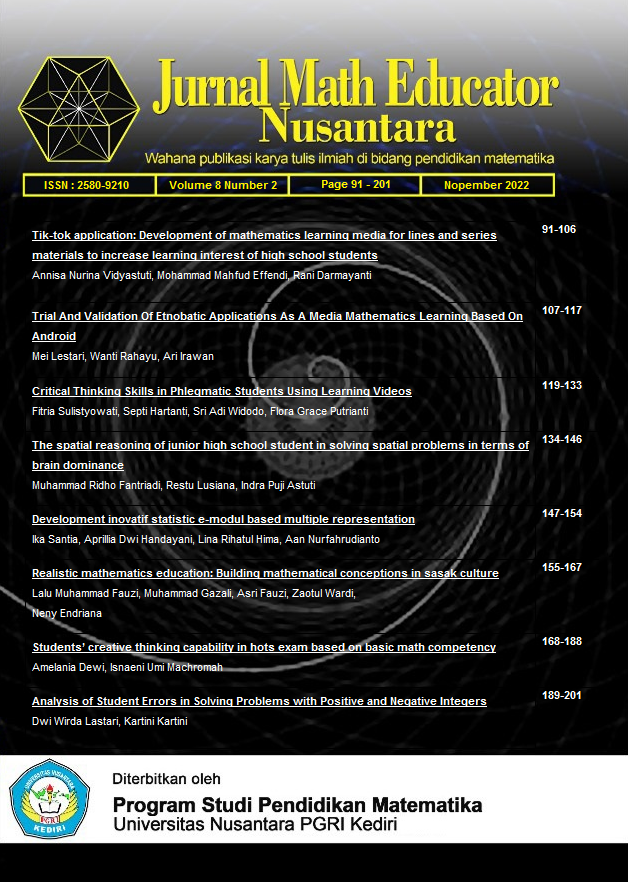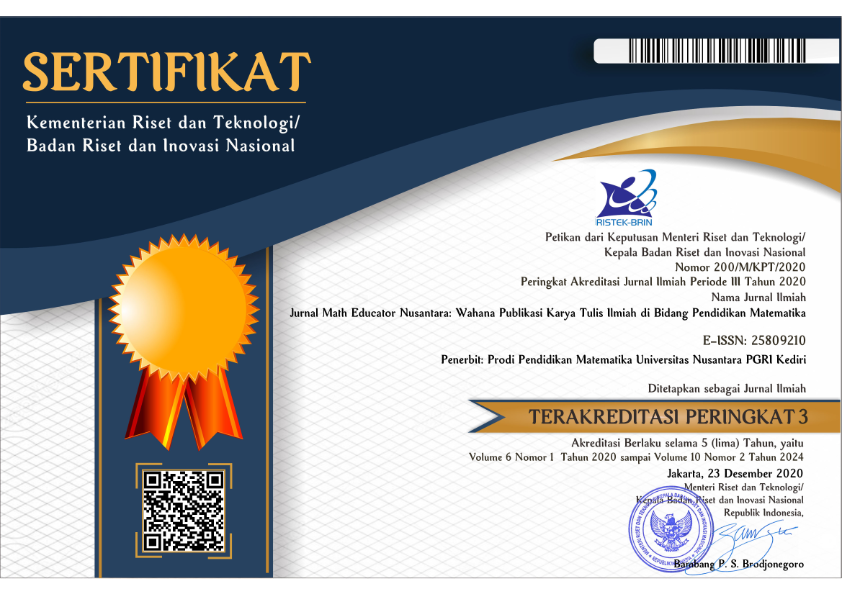Critical Thinking Skills in Phlegmatic Students Using Learning Videos
DOI:
https://doi.org/10.29407/jmen.v8i2.18874Keywords:
Critical Thinking, Plegmatic, Video of Learning, Singgle Subject ResearchAbstract
This study is single-subject research with A-B-A design that aims to find out how to increase the critical thinking skills of a phlegmatic student in learning a system of linear equations with two variables with learning videos. The subject was a class VIII junior high school student with a phlegmatic personality who was selected based on observations and interviews with counseling teachers and school principals. Data collection techniques used are observation, tests, and documentation. Data were analyzed using analysis under conditions and between conditions. The result is mean level of critical thinking skills increased from 48.6 at first baseline to 74 at intervention and 91 at second baseline. These results are supported by the overlap percentage of 0%. This indicates that the learning videos affect increasing the critical thinking skills of the phlegmatic student in learning a system of linear equations with two variables. The results of this study are expected to be a reference in further research related to critical thinking skills in students with phlegmatic personalities.
References
Anderson, T., & Dron, J. (2014). Teaching Crowds: Learning and Social Media. In Teaching Crowds: Learning and Social Media. https://doi.org/10.15215/aupress/9781927356807.01
Anggraeni, D. M., & Sole, F. B. (2018). E-Learning Moodle, Media Pembelajaran Fisika Abad 21. Jurnal Penelitian Dan Pengkajian Ilmu Pendidikan: E-Saintika, 1(2), 57–65.
Anggreini, D., Priyojadmiko, E., & Setiana, D. (2020). Analisis Koneksi Matematika Ditinjau dari Tipe Kepribadian Sanguinis, Koleris, Melankolis, dan Plegmatis. Buana Matematika: Jurnal Ilmiah Matematika Dan Pendidikan Matematika, 10(1), 71–88.
Anwar, N. T. (2018). Peran kemampuan literasi matematis pada pembelajaran matematika abad-21. Prisma, Prosiding Seminar Nasional Matematika, 1, 364–370.
Ariani, T. (2020). Analysis of Students’ Critical Thinking Skills in Physics Problems. Kasuari: Physics Education Journal, 3(1), 1–17. https://doi.org/10.37891/kpej.v3i1.119
Benyamin, B., Qohar, A., & Sulandra, I. M. (2021). Analisis Kemampuan Berpikir Kritis Siswa SMA Kelas X Dalam Memecahkan Masalah SPLTV. Jurnal Cendekia: Jurnal Pendidikan Matematika, 5(2), 909–922.
Bialik, M., Fadel, C., Trilling, B., Nilsson, P., & Groff, J. (2015). Skills for the 21 st Century: What Should Students Learn? Center for Curriculum Redesign. www.curriculumredesign.org
Blanton, M., Stephens, A., Knuth, E., Gardiner, A. M., Isler, I., & Kim, J.-S. (2015). The development of children’s algebraic thinking: The impact of a comprehensive early algebra intervention in third grade. Journal for Research in Mathematics Education, 46(1), 39–87.
Butler, H. A., Pentoney, C., & Bong, M. P. (2017). Predicting real-world outcomes: Critical thinking ability is a better predictor of life decisions than intelligence. Thinking Skills and Creativity, 25, 38–46. https://doi.org/10.1016/j.tsc.2017.06.005
Byiers, B. J., Reichle, J., & Symons, F. J. (2012). Single-subject experimental design for evidence-based practice. American Journal of Speech-Language Pathology, 21(4), 397–414. https://doi.org/10.1044/1058-0360(2012/11-0036)
Chairilsyah, D. (2012). Pembentukan kepribadian positif Anak sejak usia dini. Jurnal Educhild: Pendidikan Dan Sosial, 1(1), 1–7.
Clark, R. E. (1994). Media will never influence learning. Educational Technologies Research and Development, 42(2), 21–29. https://doi.org/10.1007/BF02299088
Etikan, I., Musa, S. A., & Alkassim, R. S. (2014). A Comparison Of Convenience Sampling And Purposive Sampling. Journal of Nursing, 5(1), 1–4. https://doi.org/j.ajtas.20160501.11
Firdaus, M., & Wilujeng, I. (2018). Pengembangan LKPD inkuiri terbimbing untuk meningkatkan keterampilan berpikir kritis dan hasil belajar peserta didik. Jurnal Inovasi Pendidikan IPA, 4(1), 26–40.
Freeman, K. A., & Eagle, R. F. (2011). Single-subject research designs. In Understanding Research in Clinical and Counseling Psychology, Second Edition (pp. 124–154). https://doi.org/10.4324/9780203831700
Gast, D. L., & Ledford, J. R. (2014). Single subject research methodology in behavioral sciences. In New York: Routledge. Routledge.
Ibrahim, I., Sujadi, I., Maarif, S., & Widodo, S. A. (2021). Increasing Mathematical Critical Thinking Skills Using Advocacy Learning with Mathematical Problem Solving. Jurnal Didaktik Matematika, 8(1), 1–14. https://doi.org/10.24815/jdm.v8i1.19200
Istiqomah, I., Yuliani, R., Ekawati, R., & Widodo, S. A. (2022). Number recognition development with number card: Single subject research. International Journal of Evaluation and Research in Education, 11(3), 1171–1182. https://doi.org/10.11591/ijere.v11i3.22662
James, K. P. (2016). Single-subject research method: The needed simplification. British Journal of Education, 4(6), 68–95. www.eajournals.org
Jonassen, D. H., Campbell, J. P., & Davidson, M. E. (1994). Learning with media: Restructuring the debate. Educational Technology Research and Development, 42(2), 31–39. https://doi.org/10.1007/BF02299089
Jupri, A., & Drijvers, P. (2016). Student difficulties in mathematizing word problems in algebra. Eurasia Journal of Mathematics, Science and Technology Education, 12(9), 2481–2502. https://doi.org/10.12973/eurasia.2016.1299a
Jupri, A., Drijvers, P., & van den Heuvel-Panhuizen, M. (2014). Difficulties in initial algebra learning in Indonesia. Mathematics Education Research Journal, 26(4). https://doi.org/10.1007/s13394-013-0097-0
Kurniawati, E., Sujiran, S., & Puspananda, D. R. (2020). Analisis Kemampuan Pemecahan Masalah Ditinjau Dari Tipe Kepribadian Materi Soal Cerita Perbandingan Pada Siswa Kelas VII SMP Pancasila Dander Tahun Pelajaran 2019/2020. Jurnal Pendidikan Educatma, 1–9.
Lestari, K. E. (2014). Implementasi Brain-Based Learning untuk meningkatkan kemampuan koneksi dan kemampuan berpikir kritis serta motivasi belajar siswa SMP. Judika (Jurnal Pendidikan Unsika), 2(1).
Martyanti, A., & Suhartini, S. (2018). Etnomatematika: Menumbuhkan Kemampuan Berpikir Kritis Melalui Budaya Dan Matematika. IndoMath: Indonesia Mathematics Education, 1(1), 35–41.
Meylina, S., & Jatmiko, J. (2019). Proses Berpikir Kritis Siswa dalam Pemecahan Masalah Matematika Berdasarkan Tipe Kepribadian Tipologi Hippocrates-Galenus. Prosiding SEMDIKJAR (Seminar Nasional Pendidikan Dan Pembelajaran).
Nanda, K. K., Tegeh, I. M., & Sudarma, I. K. (2017). Pengembangan video pembelajaran berbasis pendekatan kontekstual kelas V di SD Negeri 1 Baktiseraga. Jurnal Edutech Undiksha, 5(1), 88–99.
Nurussafa’at, F. A., Sujadi, I., & Riyadi, R. (2016). Analisis kesalahan siswa dalam menyelesaikan soal cerita pada materi volume prisma dengan fong’s shcematic model for error analysis ditinjau dari gaya kognitif siswa. Jurnal Pembelajaran Matematika, 4(2).
Nuryanti, L., Zubaidah, S., & Diantoro, M. (2018). Analisis Kemampuan Berpikir Kritis Siswa SMP. Jurnal Pendidikan, 3(2), 155–158. https://doi.org/10.17977/jptpp.v3i2.10490
Pamungkas, D. Y., & Siswanto, R. D. (2021). Identifikasi Pemecahan Masalah Matematis Peserta Didik Berdasarkan Tipe Kepribadian Hippocrates-Galenus dan Gender. Jurnal Cendekia: Jurnal Pendidikan Matematika, 05(03), 2324–2343. https://doi.org/10.31004/cendekia.v5i3.789
Prasetiyo, R., & Ma’arif, I. (2021). Kemampuan Berpikir Kritis Siswa Pada Pelajaran PJOK Saat Pembelajaran Daring Selama Pandemi Covid-19. Jurnal Pendidikan Tambusai, 5(2), 3470–3474.
Priatna, N., Lorenzia, S. A., & Widodo, S. A. (2020). STEM education at junior high school mathematics course for improving the mathematical critical thinking skills. Journal for the Education of Gifted Young Scientists, 8(3), 1173–1184. https://doi.org/10.17478/JEGYS.728209
Priyadi, R., Mustajab, A., Zaky Tatsar, M., & Kusairi, S. (2018). Analisis Kemampuan Berpikir Kritis Siswa SMA Kelas X MIPA dalam Pembelajaran Fisika. Jurnal Pendidikan Fisika Tadulako Online, 6(1), 53–55. http://jurnal.untad.ac.id/jurnal/index.php/EPFT/article/view/10020
Rohimah, S. M. (2017). Analisis learning obstacles pada materi persamaan dan pertidaksamaan linear satu variabel. JPPM (Jurnal Penelitian Dan Pembelajaran Matematika), 10(1).
Septikasari, R., & Frasandy, R. N. (2018). Keterampilan 4C abad 21 dalam pembelajaran pendidikan dasar. Tarbiyah Al-Awlad, 8(2), 107–117.
Stringfield, S. G., Luscre, D., & Gast, D. L. (2011). Effects of a story map on accelerated reader postreading test scores in students with high-functioning autism. Focus on Autism and Other Developmental Disabilities, 26(4), 218–229. https://doi.org/10.1177/1088357611423543
Sunanto, J. (2005). Mengembangkan Potensi Anak Berkelainan Penglihatan. Jakarta: Departemen Pendidikan Nasional.
Sunanto, J., Takeuchi, K., & Nakata, H. (2006). Penelitian dengan subjek tunggal. Bandung: UPI Pres.
Suraji, Maimunah, & Saragih, S. (2018). Analisis Kemampuan Pemahaman Konsep Matematis dan Kemampuan Pemecahan Masalah Matematis Siswa SMP pada Materi Sistem Persamaan Linear Dua Variabel (SPLDV). Suska Journal of Mathematics Education, 4(1), 9–16. https://doi.org/10.24014/sjme.v3i2.3897
Susilowati, S., Sajidan, S., & Ramli, M. (2017). Analisis Keterampilan Berpikir Kritis Siswa Madrasah Aliyah Negeri di Kabupaten Magetan. Prosiding Seminar Nasional Pendidikan Sains (SNPS), 223–231.
Verawati, A., Agustito, D., Pusporini, W., Utami, W. B., & Widodo, S. A. (2022). Designing Android learning media to improve problem-solving skills of ratio. Advances in Mobile Learning Educational Research, 2(1), 216–224. https://doi.org/10.25082/AMLER.2022.01.005
Widodo, S. A. (2018). Selection of Learning Media Mathematics for Junior School Students. Turkish Online Journal of Educational Technology - TOJET, 17(1), 154–160.
Widodo, S. A., Kustantini, K., Kuncoro, K. S., & Alghadari, F. (2021). Single Subject Research: Alternatif Penelitian Pendidikan Matematika di Masa New Normal. Journal of Instructional Mathematics, 2(2), 78–89. https://doi.org/10.37640/jim.v2i2.1040
Widodo, S. A., Sari, D. D., Maarif, S., Setiana, D. S., & Perbowo, K. S. (2022). Learning achievement of extroverted students in algebraic operations by tutorial learning: A single subject research. Int J Eval & Res Educ, 11(1), 99–107. https://doi.org/10.11591/ijere.v11i1.21747
Yanti, O. F., Prahmana, R. C. I., & Fitriyah, F. (2018). Single subject research: Pembelajaran phytagoras pada siswa introvert kelas VIII. Beta: Jurnal Tadris Matematika, 11(1), 37–49.
Downloads
Published
Issue
Section
License
Authors who publish with this journal agree to the following terms:
- Copyright on any article is retained by the author(s).
- The author grants the journal, the right of first publication with the work simultaneously licensed under a Creative Commons Attribution License that allows others to share the work with an acknowledgment of the work’s authorship and initial publication in this journal.
- Authors are able to enter into separate, additional contractual arrangements for the non-exclusive distribution of the journal’s published version of the work (e.g., post it to an institutional repository or publish it in a book), with an acknowledgment of its initial publication in this journal.
- Authors are permitted and encouraged to post their work online (e.g., in institutional repositories or on their website) prior to and during the submission process, as it can lead to productive exchanges, as well as earlier and greater citation of published work.
- The article and any associated published material is distributed under the Creative Commons Attribution-ShareAlike 4.0 International License
















